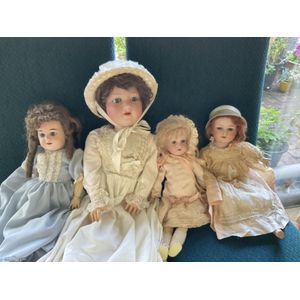
German 'Armand Marseille' Composition Jointed Body Dolls with Sleeping Eyes
A group of four German 'Armand Marseille' composition jointed body dolls. With sleeping blue eyes. Length 72 cm (largest). Provenance: From the Marie Prideaux Collection, some at the 'Hello Dolly!' exhibition at the Bendigo Art Gallery (2009-2010).
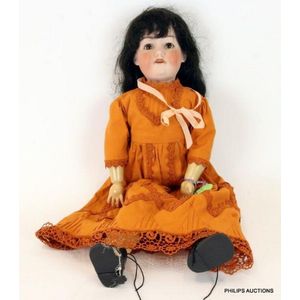
German Armand Marseille Doll, Circa 1915, Bisque Head, Indian Dress
A German Armand Marseille doll, circa 1915, the 390 mould doll with markings A5M and 390, with a bisque socket head, brown glass dormant eyes, painted lashes and brows, with an open mouth, and upper teeth, the composite body with jointed limbs, with an…
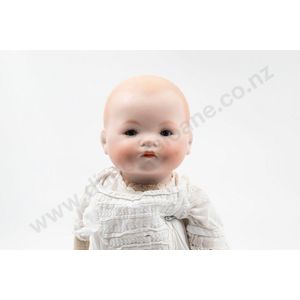
Armand Marseille Bisque Dream Baby Doll with Voice Box
Armand Marseille bisque dream baby doll, blue sleeping eyes closed mouth, flange head on rag body with working voice box, composition hands 39 cm, marked Am Germany 341/4, wearing Edwardian cotton christening (some faults)
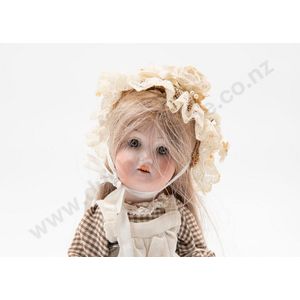
Bisque Doll Collection
Three bisque dolls, three bisque dolls;, unmarked straight limb 22 cm, faintly marked bisque doll on new jointed body 34 cm, Armand Marseille 370 bisque shoulder plate doll 34 cm
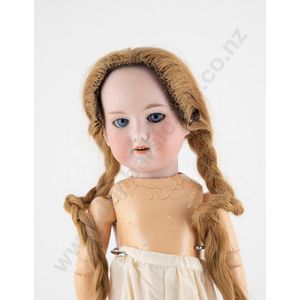
Armand Marseille Bisque Dolls with Brown and Blue Eyes
Two Armand Marseille bisque dolls, shoulder plate with brown sleeping eyes, brown nylon wig on jointed leatherette body 50 cm, socket head with blue sleeping eyes 47 cm, marked Armand Marseille 370 a 1. M and 390 a 3. M
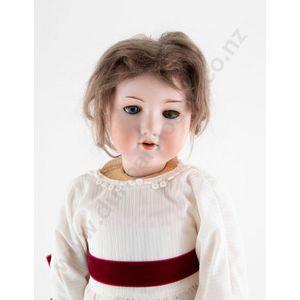
Armand Marseille Bisque Doll with Mohair Wig and Jointed Body
Armand Marseille bisque doll, blue sleeping eyes, brown mohair wig on jointed composition body 57 cm, marked Armand Marseille 390 a 4. M
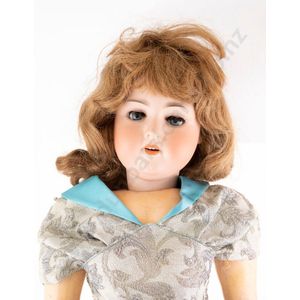
Armand Marseille Bisque Doll with Blue Sleeping Eyes
Armand Marseille bisque doll, blue sleeping eyes with lashes, light brown hair wig on ball jointed composition body 72 cm, marked Armand Marseille Germany 390. A 11. M
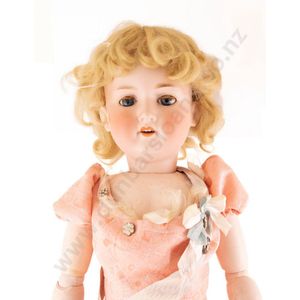
Armand Marseille Bisque Doll, Blonde Wig, Blue Eyes, 72cm
Armand Marseille bisque doll, blue sleeping eyes with lashes, blonde nylon wig on ball jointed composition body 72 cm, marked Armand Marseille Germany 390. A 12. M
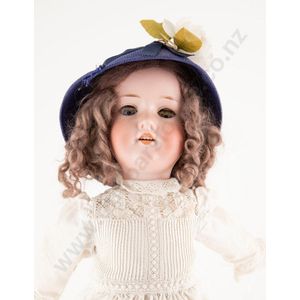
Armand Marseille Sleeping Doll with Stick Leg Body
Armand Marseille bisque doll, blue sleeping eyes with lashes brown mohair wig on jointed 'Stick leg' body 52 cm, marked Armand Marseille Germany 390. A. 4. M
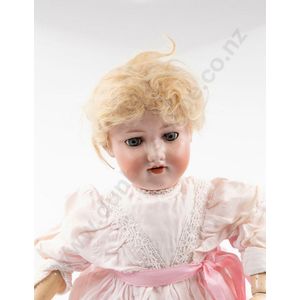
Armand Marseille Bisque Doll, Blue Eyes, Walking Mechanism - 54cm
Armand Marseille bisque doll, blue sleeping eyes blonde mohair wig on ball jointed and straight leg walking mechanism composition body 54 cm, marked Armand Marseille Germany 390. A. 5. M.
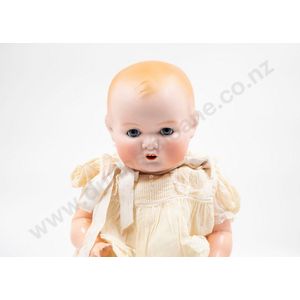
Armand Marseille Bisque Baby Doll 56cm AM Germany 518
Armand Marseille bisque character baby, blue sleeping eyes open mouth with two top teeth on 5 piece composition body 56 cm, marked A.M. Germany 518 17 1/2K
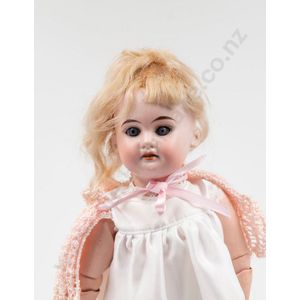
Armand Marseille Bisque Doll, 1894, Germany, Blonde Hair
Armand Marseille bisque doll, blue sleeping eyes blonde mohair wig on jointed composition body 38 cm, marked 1894 a M O Dep made in Germany
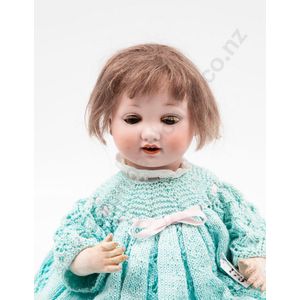
Armand Marseille Bisque Character Toddler Doll - 36 cm
Armand Marseille bisque character toddler doll, brown sleeping eyes with lashes, open mouth with two top teeth, brown mohair wig on 5 piece composition body 36 cm, marked Germany 985 a 3. M
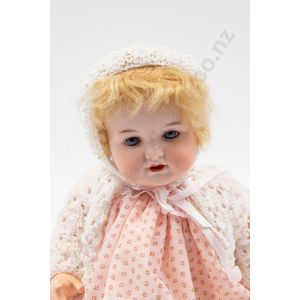
Armand Marseille Bisque Character Baby Doll with Mohair Wig
Armand Marseille bisque character baby doll, blue sleeping eyes open mouth with tongue, blonde mohair wig on 5 piece composition body 38 cm, marked Armand Marseille Germany 990 a 4. M
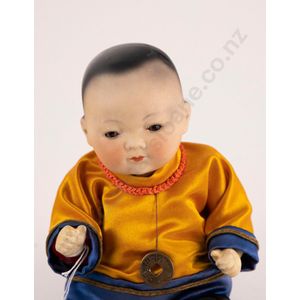
Armand Marseille Bisque Baby Doll with Asian Character Features
Armand Marseille Asian character bisque baby doll, solid dome black shaded baby hair, brown sleeping eyes closed mouth on bent limb composition body 27 cm, marked a. Ellar with star M. Germany 2.K
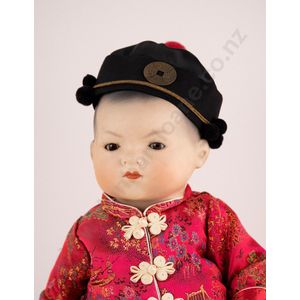
Armand Marseille Bisque Baby Doll with Asian Features
Armand Marseille Asian character bisque baby doll, solid dome black shaded baby hair, brown sleeping eyes closed mouth on bent limb composition body 45 cm, marked A.M. Germany 342./5K
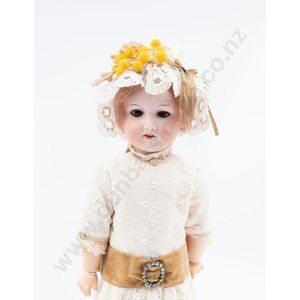
Armand Marseille Bisque Doll - 40 cm
Armand Marseille bisque doll, stationary brown eyes light brown mohair wig on ball jointed composition body 40 cm, marked Armand Marseille Germany 390 a 2/0X M
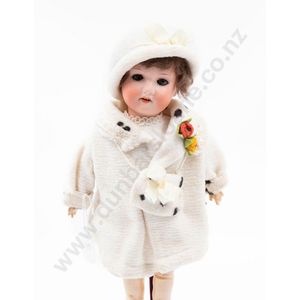
Armand Marseille Bisque Doll, 35 cm
Armand Marseille bisque doll, blue sleeping eyes brown mohair wig on jointed straight limb composition body 35 cm, marked Armand Marseille Germany 390n a 4/0X M
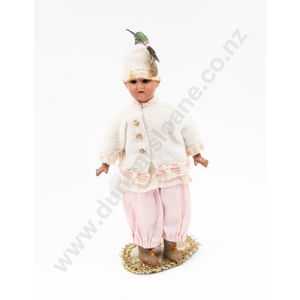
Armand Marseille Bisque Doll, Germany, 27cm
Armand Marseille brown bisque doll, blue sleeping eyes no wig on jointed composition body 27 cm, marked made in Germany Armand Marseille 390 Drgm 240/1 a 11/0 M
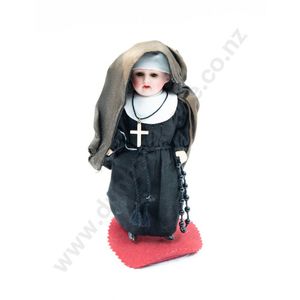
Armand Marseille Bisque Doll, 18cm, Germany Marked
Armand Marseille bisque doll, stationary dark pupiless eyes brown mohair wig on composition card body with moulded and painted black shoes 18 cm, marked Germany a 12/0 M

Armand Marseille Bisque Doll in Scottish Costume
Armand Marseille bisque doll, blue sleeping eyes brown mohair wig on jointed composition body 22 cm, marked Armand Marseille Germany 390 A10/0 M wearing original Scottish costume
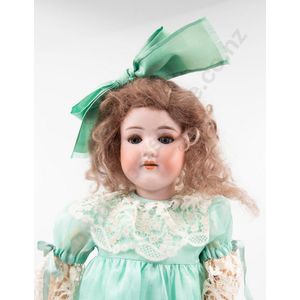
Armand Marseille Bisque Doll, 56 cm, Germany
Armand Marseille bisque doll, blue sleeping eyes with lashes, new light brown mohair wig on jointed composition body 56 cm, marked made in Germany Armand Marseille 390n a 4 M
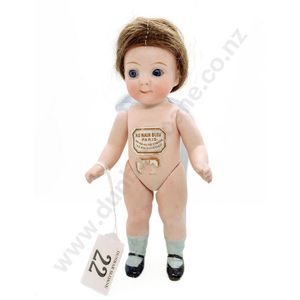
Bisque Googly Doll with Blue Eyes and Mohair Wig
All bisque Googly character doll, stationary blue googly eyes closed mouth brown mohair wig on 5 piece bent straight limb body with painted socks and shoes 14.5 cm, marked 401 14 possibly Armand Marseille with Au Nain Bleu Paris paper label to chest,…
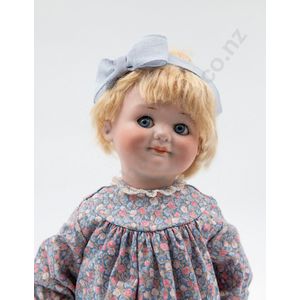
Armand Marseille Googly Toddler Doll, Germany 323
Armand Marseille 'Googly' bisque character toddler doll, blue sleeping googly eyes closed mouth, blonde mohair wig on bent/straight limb composition body 36 cm, marked Germany 323 a 0 M
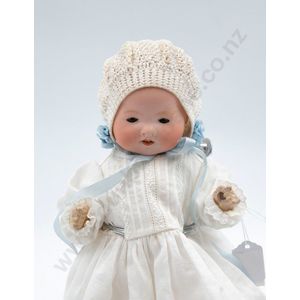
Armand Marseille Bisque Dream Baby Doll, 24cm
Armand Marseille bisque dream baby doll, brown sleeping eyes open mouth with two bottom teeth on 5 piece bent limb composition body 24 cm, marked Am Germany 351/3/0K
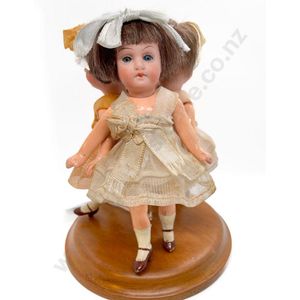
Armand Marseille Bisque Dolls with Original Dresses
Set three Armand Marseille bisque dolls, blue sleeping eyes, closed mouths with brown mohair wigs on 5 piece straight limb composition bodies 12 cm with original ribbon dresses, marked Germany a 16/0 M
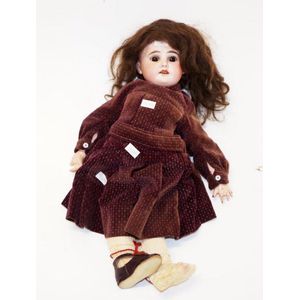
Antique German Bisque Doll #1894 in Original Clothes
Antique Armand Marseilles German bisque doll #1894, in original clothes, height 39.5 cm
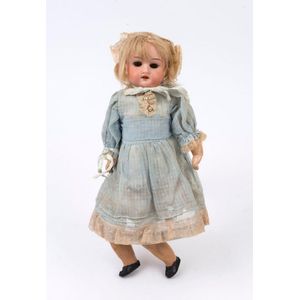
Antique Armand Marseille Doll in Original Period Dress
Armand Marseille doll: bisque head, composite body clothed in original period dress, with shoes, marked 'Made in Germany/390/A3 O.M.' on neck; 36 cm high, c.early 1900s.
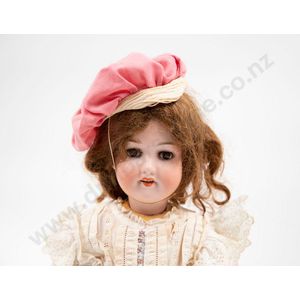
Armand Marseille Bisque Doll with Composition Body - 54cm
Armand Marseille bisque doll brown sleeping eyes brown hair wig on ball jointed composition body 54 cm marked Armand Marseille Germany 390 a 4 M
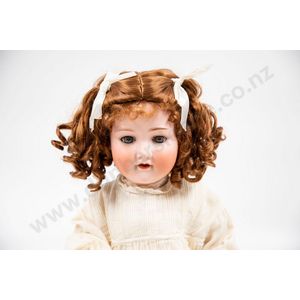
Vintage Armand Marseille Toddler Doll with Blue Sleeping Eyes
Armand Marseille bisque character toddler doll blue sleeping eyes new vintage style nylon wig on 5 piece bent/straight limb composition body 49 cm, marked Armand Marseille Germany 390 a 7 M
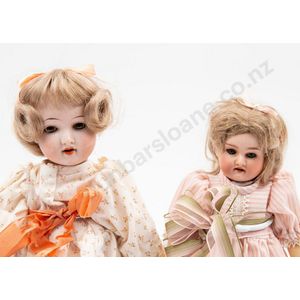
Bisque Dolls with Sleeping Eyes and New Bodies
S Pb H and Armand Marseille bisque dolls brown and blue sleeping eyes, mohair and nylon wigs both on new jointed composition bodies 29 cm, 27 cm
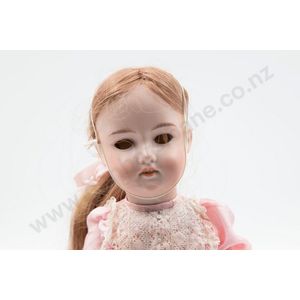
Armand Marseille Bisque Dolls with Jointed Bodies and Wigs
Two Armand Marseille bisque dolls blue stationary and brown sleeping eyes, nylon wigs on jointed bodies 46 cm, a 1 1/2 M on straight leg body other with head damage
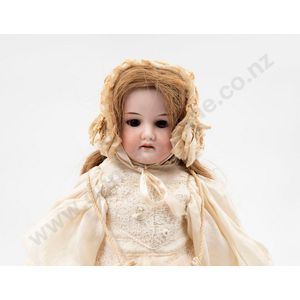
Armand Marseille Bisque Shoulder Plate Dolls - Two Sizes
Two Armand Marseille bisque shoulder plate dolls brown stationary and sleeping eyes, hair wigs on leather and rag jointed bodies 36 cm, 40 cm, head damage on smaller other doll missing hands
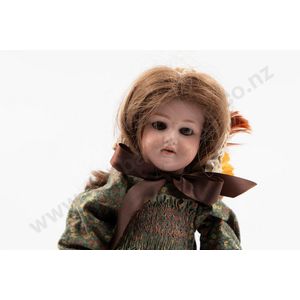
Damaged Bisque Dolls with Stationary Eyes and Wigs
SFBJ and Armand Marseille bisque dolls blue and brown stationary eyes, hair wigs on jointed bodies 46 cm and, both with head damage
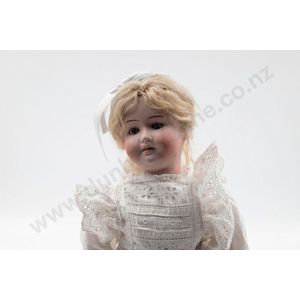
Damaged J. Walther & Sohn Armand Marseille Bisque Dolls
J Walther & Sohn Armand Marseille bisque dolls blue sleeping eyes, hair wigs and mohair wigs on jointed bodies 43 cm, 39 cm, both with head damage, marked 200 - 1 Crown over monogram 1 Germany and, made in Germany Floradora a 1 M
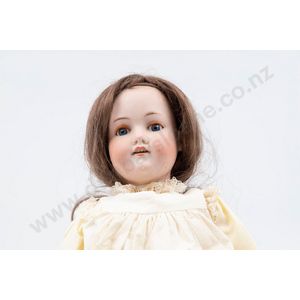
Armand Marseille Bisque Doll with Blue Sleeping Eyes
Armand Marseille bisque doll blue sleeping eyes with lashes, brown nylon wigon ball jointed body 63 cm, marked Armand Marseille Germany 390 a & M
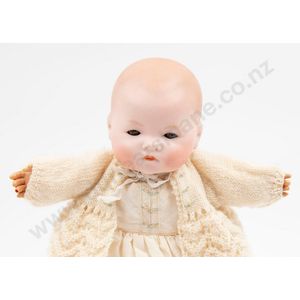
Bisque Dream Baby and Character Boy Dolls
Armand Marseille bisque socket head dream baby doll blue sleeping eyes closed mouth on new rag body with celluloid hands 35 cm (chip to lefty eye socket, together with Gebruder Heubach bisque character boy all painted features on 5 piece body (repaired…
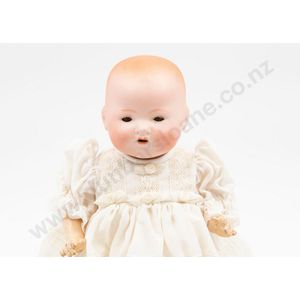
Bisque Baby Dolls with Composition Bodies (10 words)
Two bisque character baby dolls Schoenau & Hoffmeister and Armand Marseille both with face faults on composition bent limb bodies 30 cm, 32 cm
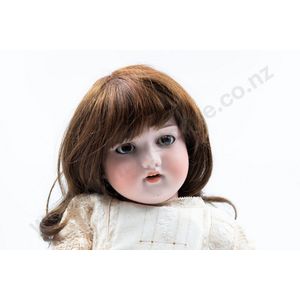
Armand Marseille Bisque Doll with Ball Jointed Body
Large Armand Marseille bisque doll brown sleeping eyes dark brown nylon wig on ball jointed body 73 cm, marked Armand Marsille Germany 390 a 13 M
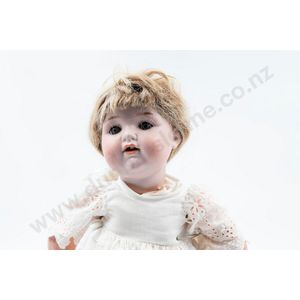
Armand Marseille Bisque Character Toddler Doll 44cm
Armand Marseille bisque character toddler doll blue sleeping eyes, open mouth with top teeth (one missing), brown hair wig on 5 piece bent limb body 44 cm, marked Armand Marseille Germany 990 a 6 M

Bisque Dream Babies with Bent Limb Bodies
Armand Marseille brown bisque dream baby and Jutta baby, dark pupiless sleeping eyes (need re-setting) and blue stationary eyes both on 5 piece bent limb bodies 30 cm, 33 cm, marked Am Germany 351/2 1/2K, marked 3/0 Jutta 1914 5 1/2
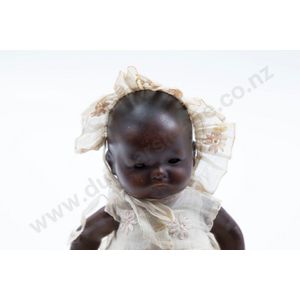
Armand Marseille Sleeping Dream Baby Bisque Doll - 25cm
Armand Marseille brown bisque dream baby brown sleeping eyes, closed mouth on 5 piece bent limb body 25 cm, marked a M Germany 341/2K
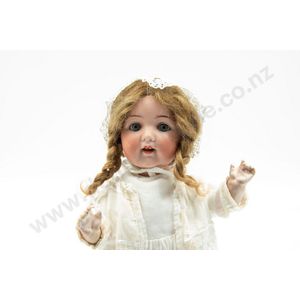
Armand Marseille Bisque Baby Doll with Blue Sleeping Eyes
Armand Marseille bisque character baby doll blue sleeping eyes light brown mohair wig, open mouth with tongue two top teeth on 5 piece bent limb body 34 cm, marked Armand Marseille 995 a 1 M
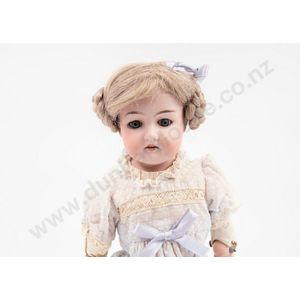
Armand Marseille Bisque Shoulder Plate Doll - 43 cm
Armand Marseille bisque shoulder plate doll blue sleeping eyes light brown hair wig on leatherette body with composition lower limbs 43 cm, marked 370 a M 2/0 Dep Armand Marseille made in Germany
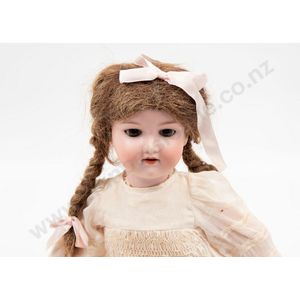
Armand Marseille Bisque Doll with Brown Sleeping Eyes
'Alexandra' Armand Marseille bisque doll brown sleeping eyes, brown hair wig on jointed composition body 57 cm, marked Armand Marseille 390 a 5 M
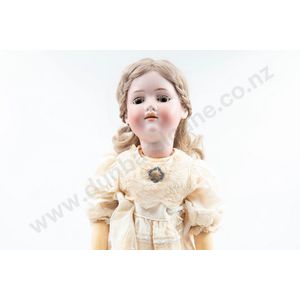
Armand Marseille Bisque Doll with Brown Sleeping Eyes
'Doreen Linda' Armand Marseille bisque doll brown sleeping eyes with lashes, light brown nylon wig on ball jointed body 59 cm, marked Armand Marseille Germany 390. A 6 1/2 M
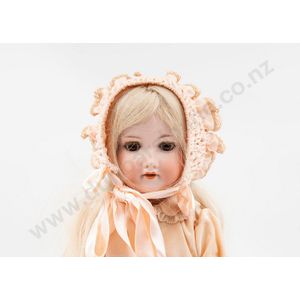
Armand Marseille Bisque Doll with Blonde Hair and Brown Eyes
'Heather' Armand Marseille bisque doll brown sleeping eyes with lashes, blonde hair wig on ball jointed composition body 48 cm, marked Armand Marseille Germany 390 a 3 M
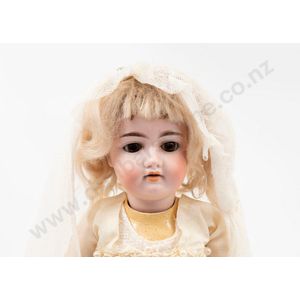
Vintage German Bisque Doll in Wedding Gown
Armand Marseille bisque doll brown sleeping eyes blonde hair wig on ball jointed body 46 cm, marked made in Germany 390 a 2 M, wearing vintage wedding gown and under garments
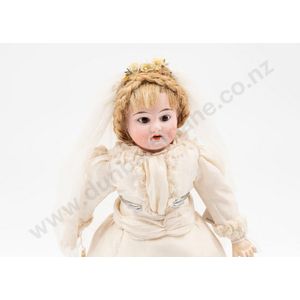
Vintage AM Bisque Doll in Wedding Gown
Armand Marseille bisque doll dark brown stationary eyes, light brown hair wig on jointed composition body 31 cm, marked AM5/0DEP, with dressed in vintage wedding gown and under garments
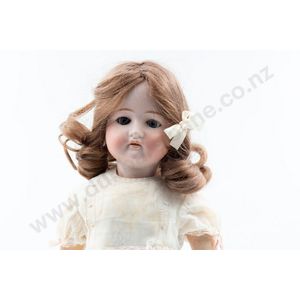
Damaged 55cm and 49cm Bisque Dolls with Sleeping Eyes
Armand Marseille and Simon & Halbig bisque dolls brown and blue sleeping eyes, hair wigs on ball jointed bodies 55 cm, 49 cm, both with head damage
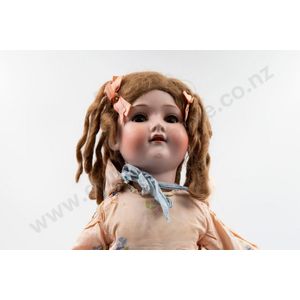
Armand Marseille Bisque Doll with Extra Head and Body
Armand Marseille bisque doll brown sleeping eyes, brown mohair wig on ball jointed composition body needs re-stringing missing one ball joint 67 cm together with Armand Marseille a 9 M head (no eyes) on part composition body and composition shoulder plate
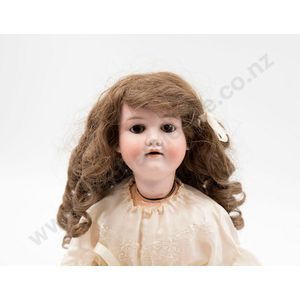
Armand Marseille Bisque Doll with Brown Sleeping Eyes
Armand Marseille bisque doll brown sleeping eyes no teeth, brown nylon wig on jointed stick leg body with new composition lower arms 52 cm, marked made in Germany Armand Marseille 390n a 4 M
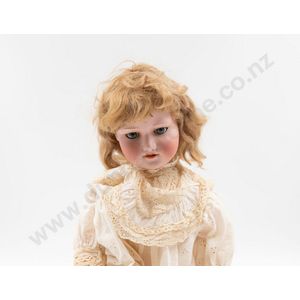
Armand Marseille Bisque Doll with Walking Body & Voice Box
Armand Marseille bisque doll blue sleeping eyes light brown mohair wig on ball jointed composition walking body with working voice box 69 cm, marked Armand Marseille Germany 390 a 9 M

Armand Marseille Sleeping Baby Doll with Nightgown
Sleeping baby doll, Armand Marseille, Germany-351 6K height 51 cm, bisque head, marks on arms and ink on feet. Wear to paint on cheeks. Painted hair. Sleeping blue eyes. Nightgown.
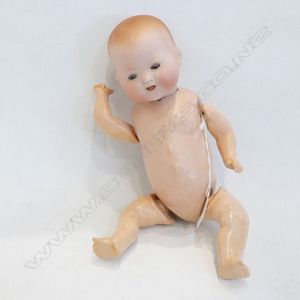
Armand Marseille 351.12K Baby Doll, Germany - 29cm Height
Armand Marseille 351.12K, baby doll, Germany height 29 cm
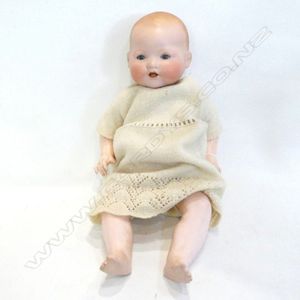
Armand Marseille Crying Baby Doll with Knitted Outfit
Armand Marseille crying baby doll height 47 cm, bisque head with painted hair. Porcelain body. Blue sleeping eyes. Knitted dress / pants and vest.
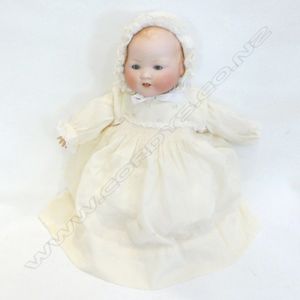
Armand Marseille German Baby Doll
Old baby doll, Armand Marseille, Germany- 390 height 44 cm, bisque head / porcelain hands and cloth body arms and legs. Painted hair. Sleeping eyes. Shirred cream dress and bonnet
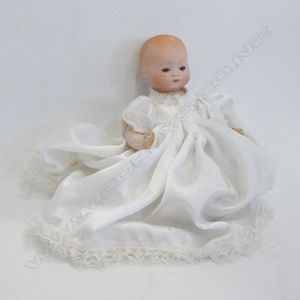
Armand Marseille Small Baby Doll, Germany
Small baby doll Armand Marseille, Germany-B??, height 18 cm, bisque head, composite body and arms. Porcelain moveable legs. Painted hair.
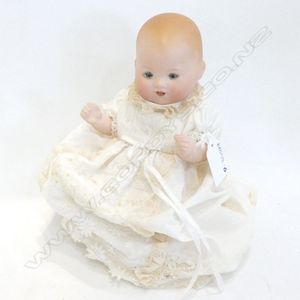
Armand Marseille Baby Doll with Missing Bootie
Small baby doll. Armand Marseille, Germany-351 1210K height 25 cm, bisque head and porcelain body, moveable legs. White cotton and lace dress grubby, one bootie missing
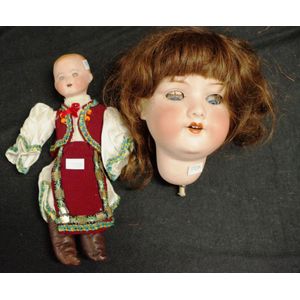
Antique Armand Marseilles Bisque Doll Heads - Baby #352 & #390
Two Antique Armand Marseilles bisque dolls heads including baby #352, height 24 cm and #390, height 17.5 cm.
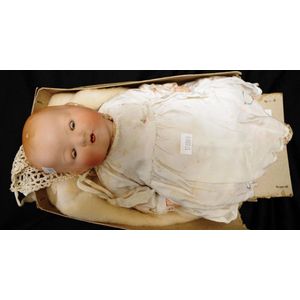
Antique German Bisque Doll in Original Silk Dress
Antique Armand Marseilles German bisque doll marked to back of neck, in original silk dress, crotchet bonnet and shoes
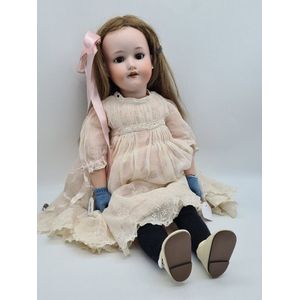
Armand Marseille German Bisque Doll with Composition Body
Antique doll, Armand Marseille German bisque headed doll with jointed composition body, stamped to back of neck 390, A4.M original hair, glass eyes 54 cm
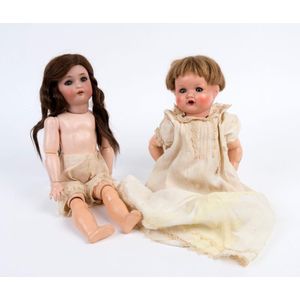
Pair of Antique German Porcelain Dolls, Early 1900s
Two Armand Marseille antique German porcelain headed dolls, circa 1900, 40 cm and 44 cm high
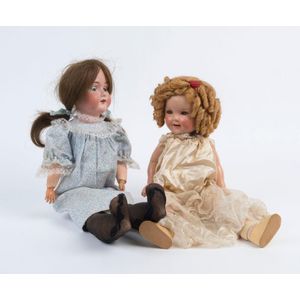
Armand Marseille and Shirley Temple Dolls
Dolls comprising Armand Marseille with bisque head, 21' (53 cm), open mouth with upper teeth, period dress on composite body, made in Germany; also Shirley temple doll 21' (53 cm) composite doll, sleeping eyes; usual cracking/crazing and aged dress. (2…
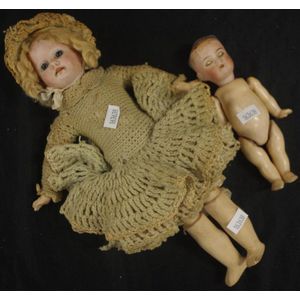
Antique German Porcelain Dolls - Armand Marseille, 30cm Height
Two antique German porcelain dolls including a Armand Marseille, height 30 cm
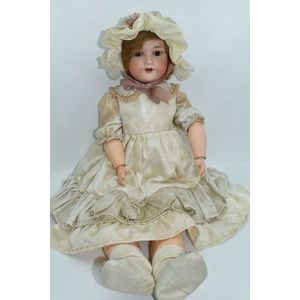
German Porcelain Doll with Finger Damage
German Armand Marseille 390 7M.150.250 doll with porcelain face a/f to finger
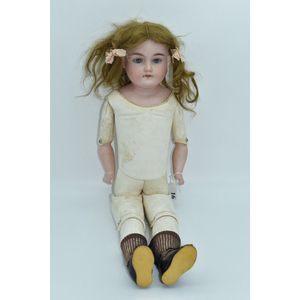
Rare Leather-Jointed Beauty Doll by Armand Marseille
Armand Marseille 'Beauty' porcelain head doll with rare leather jointed body
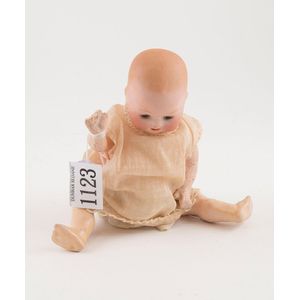
Armand Marseille Bisque Dream Baby with Bent Limbs
Armand Marseille bisque dream baby dark pupiless eyes, open mouth with two bottom teeth on 5 piece bent limb body 18 cm marked Am Germany 351 / 7/0
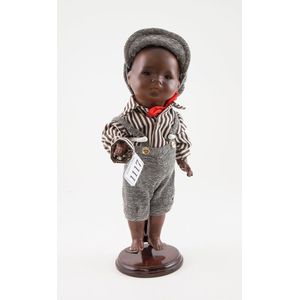
Brown Bisque Dream Baby Doll by Armand Marseille
Armand Marseille brown brown bisque dream baby character doll brown sleeping eyes closed mouth on straight/bent limb body 26 cm marked a M Germany 341/0K
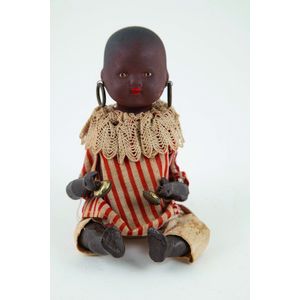
Armand Marseille Character Doll with Squeeze Box Body
Armand Marseille all brown composition character doll, all painted features, flange head on 'Squeeze box' sitting body the mechanism raises the arms with bells attached 12 cm seated height, marked a M German 351... With original earring rings and costume,…
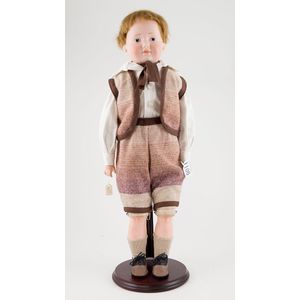
Armand Marseille Character Boy Doll, 48cm
Armand Marseille bisque shoulder plate character boy doll all moulded painted features with light brown mohair wig on jointed leatherette body with composition lower limbs 48 cm marked 640 a 3 M Germany
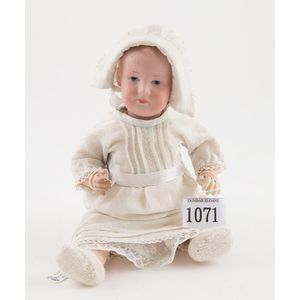
Armand Marseille Bisque Character Baby Doll, 24 cm
Armand Marseille bisque character baby moulded and painted features with closed mouth on 5 piece body 24 cm marked 500 Germany Drgm a 3/0 M

Black bisque character baby by Armand Marseille
Armand Marseille black bisque character baby brown stationary eyes pierced ears on 5 piece bent limb body 23 cm marked Am Germany 362/0K
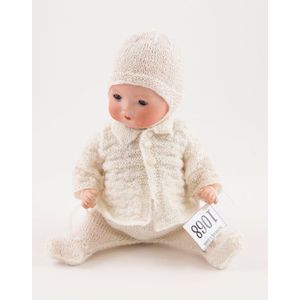
Armand Marseille Bisque Dream Baby with Blue Sleeping Eyes
Armand Marseille bisque dream baby blue sleeping eyes closed mouth, 5 piece body 23 cm marked a M Germany 341/4/0K
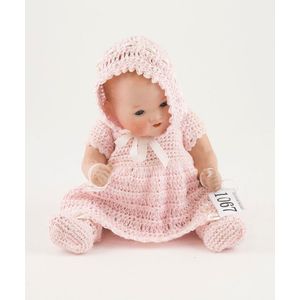
Armand Marseille Bisque Dream Baby with Blue Eyes
Armand Marseille bisque dream baby blue sleeping eyes open mouth with two bottom teeth, 5 piece body 23 cm marked a M Germany 351/2/0K
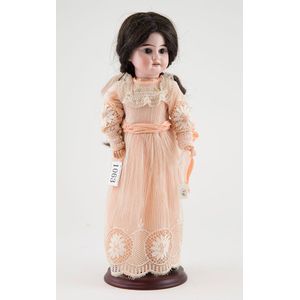
Armand Marseille Bisque Doll with Jointed Body and Wig
Armand Marseille bisque doll brown eyes dark brown hair wig on jointed body 34 cm marked 1894 a M 2/0 Dep made in Germany
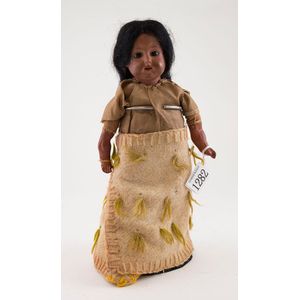
Brown Bisque Shoulder Plate Doll with Wool Cape
Armand Marseille 370 brown bisque shoulder plate doll dark pupiless eyes, black mohair wig on rag body with bisque hands 27 cm wearing full length skirt with wool cape
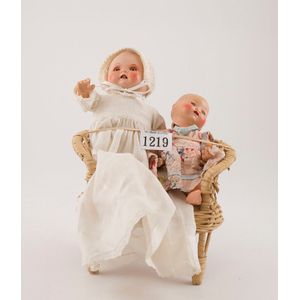
Pair of German Bisque Character Baby Dolls
Two German painted bisque character baby dolls sleeping eyes, rag and bent limb bodies 22 cm, 16 cm marked Germany... And Am 351
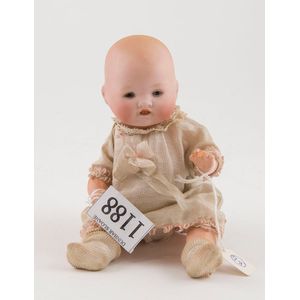
Armand Marseille Dream Baby Doll - 18cm
Armand Marseille bisque dream baby doll dark stationary eyes open mouth with two bottom teeth on 5 piece body 18 cm marked a M Germany 351 6/0K with original cotton skirt
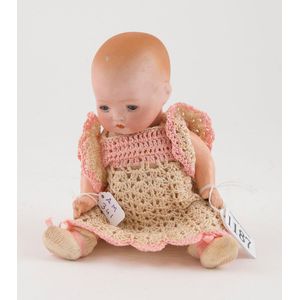
Armand Marseille Bisque Dream Baby Doll with Blue Eyes
Armand Marseille bisque dream baby doll blue sleeping eyes closed mouth on bent limb body 18.5 cm marked a M Germany 341/5/0K
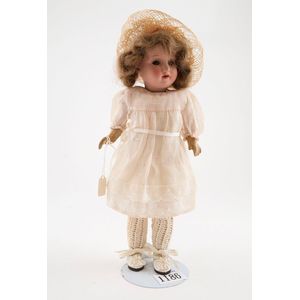
Armand Marseille Bisque Doll - Blue Eyes, Brown Wig 25cm
Armand Marseille painted bisque doll blue eyes, light brown mohair wig on bent/straight limb body 25 cm marked Armand Marseille Germany 390 a 9/0 M
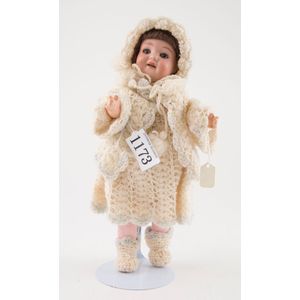
Armand Marseille Bisque Doll 29cm 560/10 Blue Eyes
Armand Marseille bisque doll blue eyes, brown mohair wig on 5 piece bent/straight limb body 29 cm marked... 560 a 10/0 M Drm R 232/1
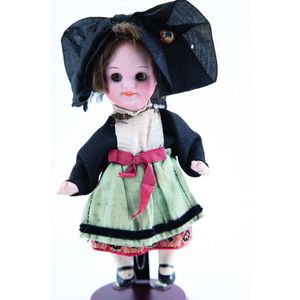
Armand Marseille Googly Doll with Alsatian Outfit
Armand Marseille 'Googly' character doll, brown stationary eyes closed mouth with brown mohair wig on bent/straight limb 5 piece body 17 cm, marked 323 Germany a 11/0 M with original French Alsatian national costume outfit
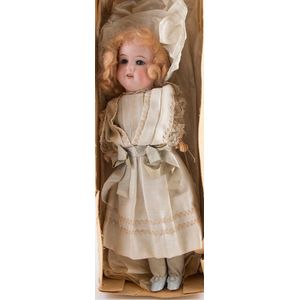
Armand Marseille Floradora Bisque Doll with Original Outfit
Armand Marseille Floradora bisque doll blue eyes, blonde mohair wig on 5 piece straight limb body 34 cm marked made in Germany Armand Marseille Drgm 240/1 Floradora a 3/0X M with original outfit and card box
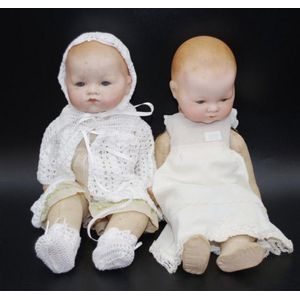
Antique German Bisque Dolls: Armand Marseille & Tallest Pair
Two antique German bisque dolls including Am Armand Marseille, 32 cm high tallest
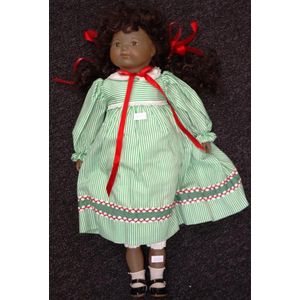
Armand Marseilles German Porcelain Doll - 48cm Height
Armand Marseilles German porcelain doll, height 48 cm
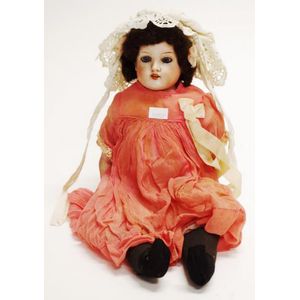
Antique German Bisque Doll, Armand Marseille, Circa 1900
Antique Armand Marseille German bisque doll Circa 1900, with impressed marks to back and No:370, height 35 cm
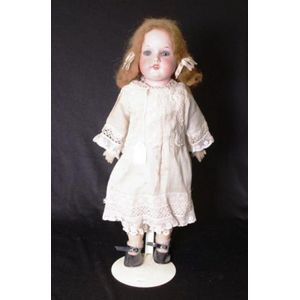
Antique German Bisque Doll, Armand Marseille, Circa 1900
Antique Armand Marseille German bisque doll, Circa 1900,with original wig, sleep glass eyes and ball-jointed body, with impressed marks and no:370 to back of neck, in original clothes, height 41.5 cm
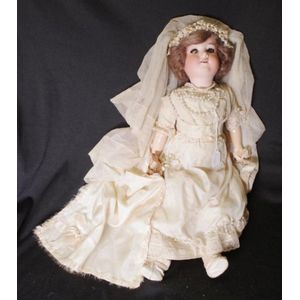
Antique German Bisque Bride Doll, 1900
Antique Armand Marseille German bisque bride doll, Circa 1900,with original wig, sleep glass eyes and ball-jointed body, with impressed marks and no:390n to back of neck, in original clothes, height 52 cm
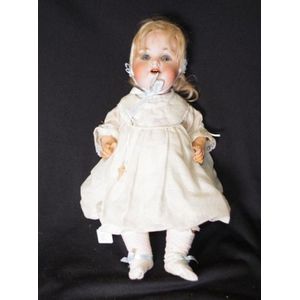
Antique German Bisque Doll, Circa 1900
Antique Armand Marseille German bisque doll, Circa 1900,with original wig, sleep glass eyes and ball-jointed body, with impressed marks and no:900 to back of neck, in original clothes, height 40 cm
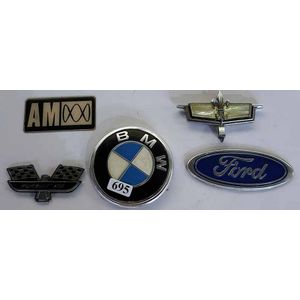
Iconic Car Badges: BMW, AM, Ford, Pursuit 170 & More
Five car badges, including Bmw, Am, Ford, and Pursuit 170 and one other.
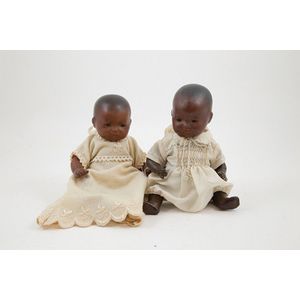
Rag Baby and Tiny Teddy Set
AM Dream Baby as above on rag body 17 cm together with tiny Steiff teddy bear 7 cm seated
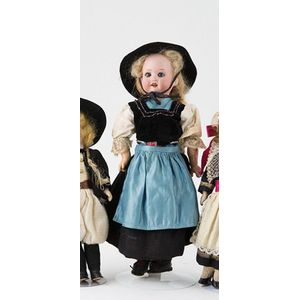
Armand Marseille Doll in Breton National Costume
Armand Marseille Doll, blue sleeping eyes, blonde mohair wig on jointed body 31 cm, marked Armand Marseille Germany 390 A 6/0 M wearing original Breton national costume
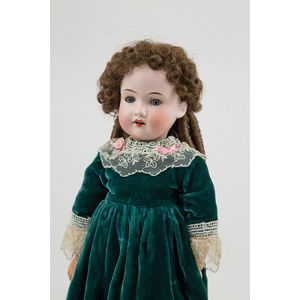
Armand Marseille Dolls, 44cm & 34cm (Hair-line Crack)
Armand Marseille 390 Doll, blue stationary eyes, brown mohair wig on French body 44 cm, together with small Armand Marseille doll 34 cm (hair-line crack to side of head)
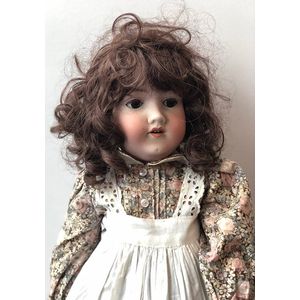
Armand Marseille 66cm Brown Sleeping Doll with Ball Jointed Body
Armand Marseille Doll, brown sleeping eyes, brown nylon wig on ball jointed body 66 cm marked Armand Marseille Germany 390 A 8 M
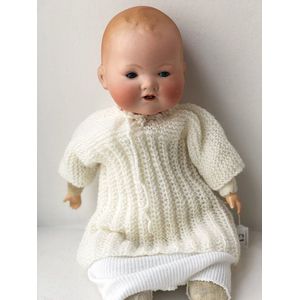
Armand Marseille Sleeping Baby Doll 40cm AM Germany 351/4
Armand Marseille Dream Baby, sleeping blue eyes, two bottom teeth on rag body 40 cm marked AM Germany 351./4
 Loading more...
Loading more...